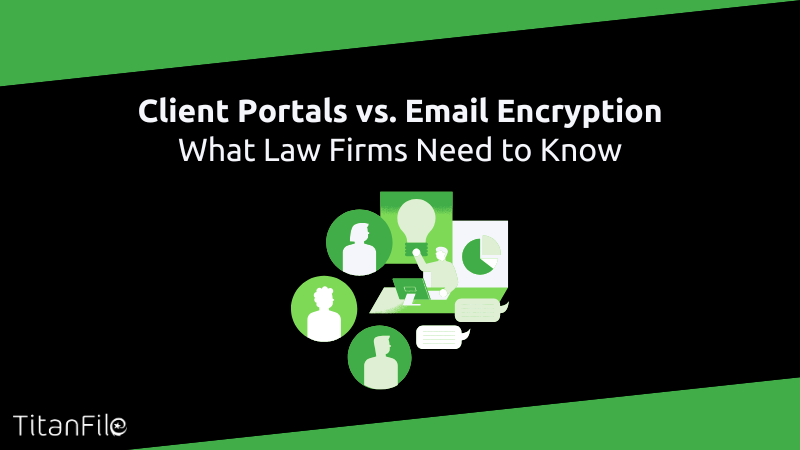Law firms handle highly confidential client information every day, everything from discovery files to financial records and settlement agreements. Protecting this data is not optional; it’s an ethical and regulatory requirement.
Two tools are often used to keep these communications secure: email encryption and client portals. But while both have their place, they solve very different problems. Understanding the difference can save your firm from unnecessary risk, improve client experience, and reduce IT headaches.
Key Takeaways
Use encrypted email for quick, low‑risk updates where there are no large attachments or back‑and‑forth collaboration.
Use a client portal when you need two‑way exchange, large files, audit logs, revocation, or data residency controls, essentially, anything that must be organized and defensible.
Why Encrypted Email Isn’t Enough on Its Own
Encrypted email (TLS, S/MIME, or Microsoft Purview Message Encryption) works well for simple, one-to-one messages. It protects data in transit and adds a layer of security against interception.
However, it falls short in the real world of legal workflows:
- No safety net for human error: If someone enters the wrong address, encryption can’t stop a misdirected message from reaching the wrong recipient.
- Attachment limits: Email platforms still restrict file sizes. Outlook defaults to 25 MB, and Gmail is the same, forcing lawyers to compress or split documents.
- No revocation control: Once sent, an email can’t be recalled across organizations.
- Limited auditability: There’s no reliable way to prove who accessed which documents, when, or from where.
For high-stakes matters where you need to exchange large volumes of files, demonstrate compliance, or maintain client confidence, a secure client portal is the safer and more efficient option.
When a Client Portal Is the Better Choice
There comes a point when encrypted email just can’t keep up with the way modern law firms work. As files get larger, matters get more complex, and regulatory requirements tighten, firms need more than just encryption; they need structure, visibility, and control.
That’s where a secure client portal shines. It turns fragmented email exchanges into an organized, auditable, and client-friendly workflow. Think of it as your firm’s digital workspace for every matter that needs both collaboration and compliance.
Choose a portal for scenarios like:
- Ongoing matters with two‑way exchanges, productions, and approvals.
- Large file transfers (videos, briefs, eDiscovery exports) that routinely break email.
- Regulated data (PII/PHI) that requires stronger controls, auditability, and retention policies.
- Cross‑border concerns where data residency in the U.S., Canada, or the EU matters to clients and regulators.
- Revocation and access control to remove a user or kill access without relying on email “recall.”
A legal‑grade portal gives you authenticated access, detailed audit trails, and policy‑friendly retention without forcing clients to learn a complicated system.
What Makes Client Portals More Effective for Law Firms
Client portals go beyond security; they bring structure, visibility, and efficiency to every legal matter. Instead of juggling long email threads and attachments, lawyers and clients can securely share files, exchange messages, and track activity in one organized workspace.
Here’s why more firms are relying on portals to modernize their workflows:
- Better control and governance: Permissions, audit trails, and access logs help firms meet ABA Formal Opinion 477R and PIPEDA compliance standards.
- Handles large files with ease: No need to compress or split documents. With TitanFile, uploads reach speeds of up to 500 Mbps, with no file size limits.
- Revocation and oversight: Access can be revoked instantly, something traditional email simply can’t do.
- Simplified client experience: Clients log in easily, view organized folders, and collaborate without confusion or extra training.
- Data residency options: Choose where your data is stored—Canada, the U.S., the EU, the Middle East or Australia to stay compliant with local privacy laws and client expectations
A Hybrid Approach That Works Best in Law Practice
Many law firms find that the best solution isn’t choosing between email encryption and client portals, but it’s using both strategically. Encrypted email still plays an important role for quick, low-risk updates or time-sensitive communications where convenience matters most. For short messages that don’t include confidential attachments, encryption adds a layer of security without slowing anyone down.
However, when the conversation shifts to exchanging sensitive case files, discovery documents, or client records that require tracking and retention, a secure client portal becomes the smarter option. Portals add structure and governance, ensuring every file is logged, access is monitored, and data remains protected long after it’s sent. This hybrid model gives firms the best of both worlds: the ease and familiarity of email and the auditability and compliance controls of a secure portal, keeping operations smooth, clients happy, and regulators satisfied.
The Bottom Line
Email encryption will always play a role in legal communication. But as files get larger, regulations get stricter, and clients expect faster service, client portals have become the modern standard for secure collaboration.
For law firms that value both security and simplicity, a platform like TitanFile delivers both, as easy to use as email but powerful enough for enterprise-level compliance and governance.
Start a 15-day free trial or book a demo to see how TitanFile can help your firm protect client data while working faster and smarter.
Client Portal vs. Email Encryption: FAQs
When should a lawyer use a client portal instead of email?
Lawyers should use a client portal when sharing sensitive documents, collaborating with clients, or sending large files that require audit trails and access control.
What file size limits apply to email attachments vs. client portals?
Most email systems limit attachments to about 25 MB, which can be restrictive for case files or exhibits. A secure client portal like TitanFile supports very large files with no practical size limits and offers upload speeds of up to 500 Mbps.
Can a secure client portal replace email encryption entirely?
Not always. Encrypted email is still useful for quick, low-risk updates. But for confidential files, client records, or regulated data, a secure client portal is safer. Many firms use both email for short notes and client portals for secure, auditable exchanges.
Do client portals integrate with Outlook or document management systems?
Yes. Modern legal portals like TitanFile integrate directly with Outlook and popular document management systems. This lets users send and receive files securely without leaving their usual workflow, improving adoption and saving time.



